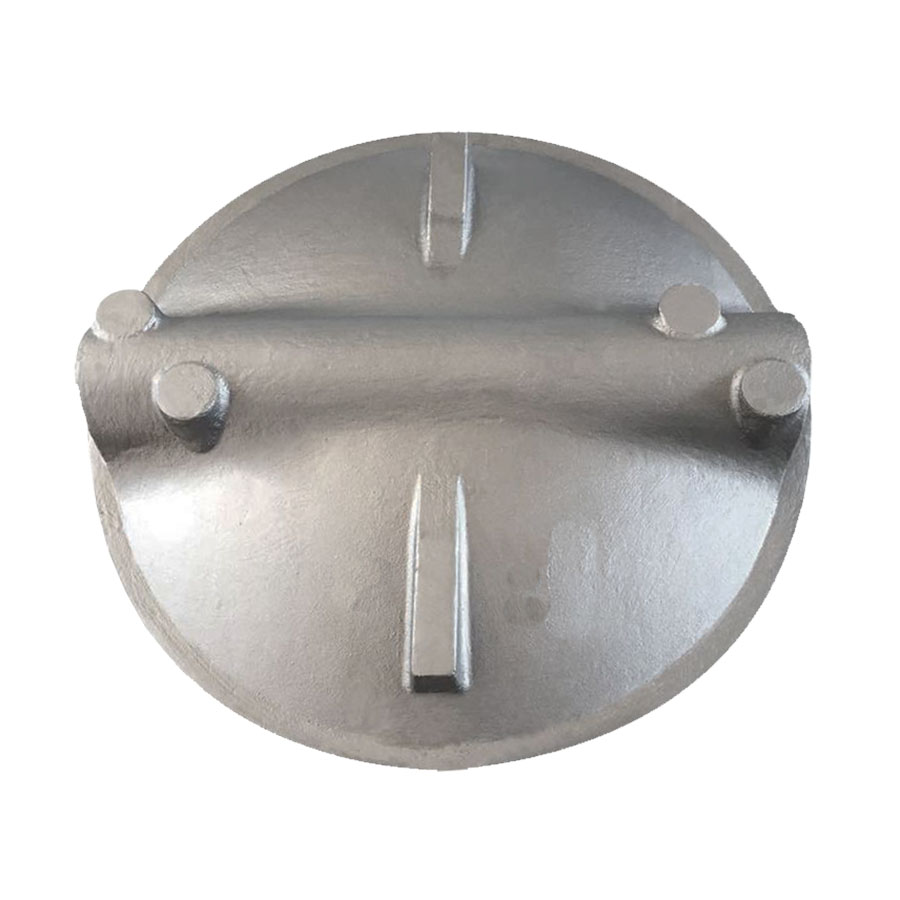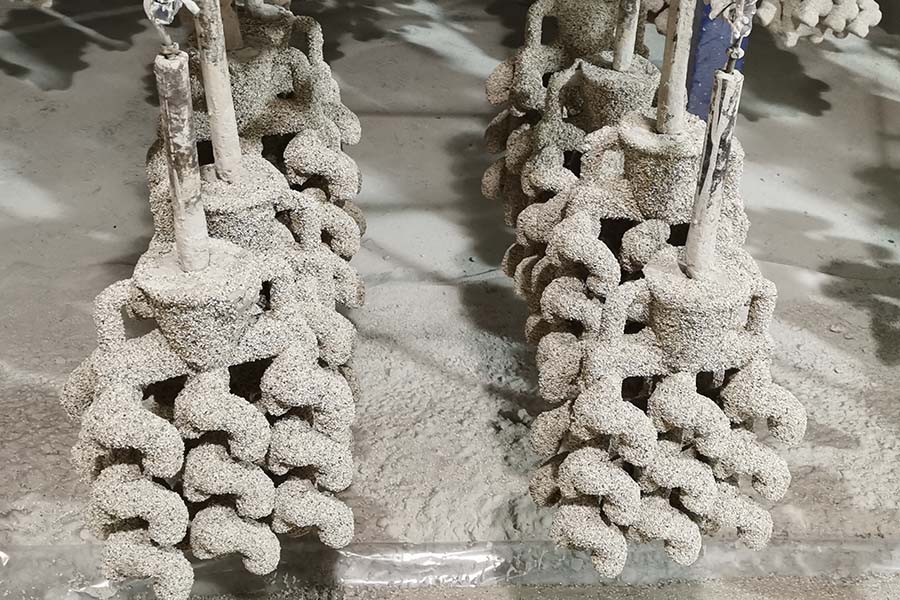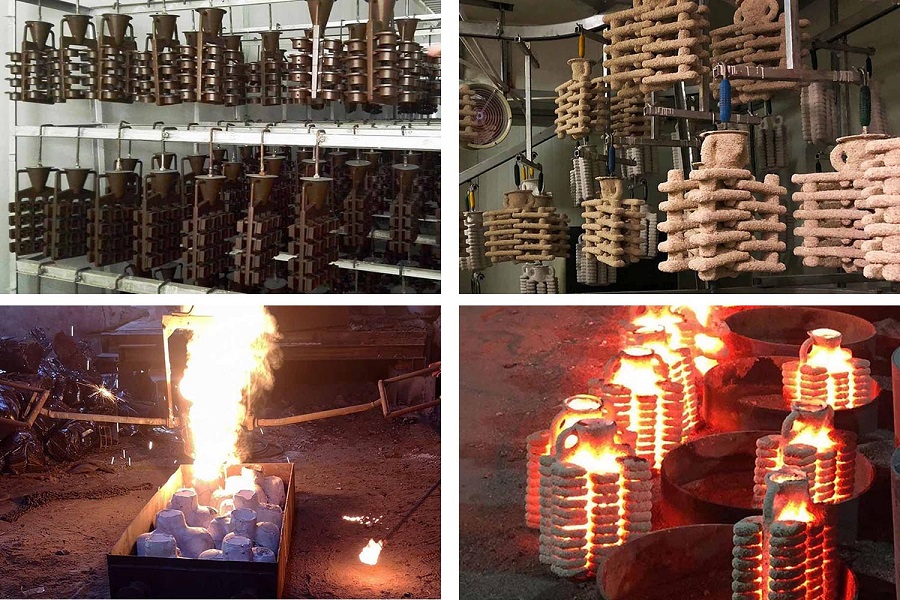
China Steel Lost Wax Investment Casting Foundry
Material: Stainless Steel, Carbon Steel, Alloy Steel Process: Silica Sol or Water Glass Lost Wax Casting Weight: 1.20 kg Application: Butterfly Valve Disc
China Steel Lost Wax Investment Casting Foundry with OEM Custom and CNC Precision Machining Services. Available molten metals: carbon steel, alloy steel, stainless steel and super duplex stainless steel.
China Steel Lost Wax Investment Casting with OEM Custom and CNC Precision Machining Services
As a steel lost wax investment casting foundry in China, the stainless steel we are using for lost wax investment casting mainly include (but not limited to): Stainless Steel: AISI 304, AISI 304L, AISI 316, AISI 316L, 1.4404, 1.4301, super duplex stainless steel and other stainless steel grade.
Investment Casting Technical Data at RMC Foundry
R & D
Software: Solidworks, CAD, Procast, Pro-e
Lead Time for Development and Samples: 25 to 35 days
Molten Metal
Ferritic Stainless Steel, Martensitic Stainless Steel, Austenitic stainless steel, Precipitation Hardening Stainless Steel, Duplex Stainless Steel
Carbon Steel, Alloy Steel, Tool Steel, Heat Resistant Steel,
Nickle-base Alloy, Aluminium Alloy, Copper-base Alloy, Cobalt-base Alloy
Metal Standard
ISO, GB, ASTM, SAE, GOST EN, DIN, JIS, BS
Material for Shell Building
Silica Sol (Precipitated Silica )
Water Glass (Sodium Silicate)
Mixtures of Silica Sol and Water Glass
Technical Parameter
Piece Weight: 2 gram to 200 kilo gram
Max Dimension: 1,000 mm for Diameter or Length
Min Wall Thickness: 1.5mm
Casting Roughness: Ra 3.2-6.4, Machining Roughness: Ra 1.6
Tolerance of Casting: CT4 ~ CT7 According to ISO8062; VDG P690, D1/CT5-7
Tolerance of Machining: ISO 2768-mk/IT6
Inner Core: Ceramic Core, Urea Core, Water Soluble Wax Core
Heat Treatment
Normalizing, Tempering, Quenching, Annealing, Solution, Carburization.
Surface Treatment
Polishing, Sand / Shot Blasting, Zinc Plating, Nickel Plating, Oxidation Treatment, Phosphating, Powder Painting, Geormet, Anodizing
Dimension Testing
CMM, Vernier Caliper, Inside Caliper. Depth Gage, Height Gage, Go/No go Gage, Special Fixtures
Chemical Inspection
Chemical Compostion Analysis (20 chemical elements), Cleanliness Inspection, X-ray Radiographic Inspection, Carbon-Sulfur Analyser
Physical Inspection
Dynamic Balancing, Static Blancing, Mechanical Properties (Hardness, Yield Strength, Tensile Strength), Elongation
Production Capacity
More than 250 tons per month, more than 3,000 tons annually.
▶ Ferrous and Non-ferrous Materials for Investment Casting, Lost Wax Casting Process:
- Gray Iron: HT150, HT200, HT250, HT300, HT350; EN-GJL-100, EN-GJL-150, EN-GJL-200, EN-GJL-250, EN-GJL-300, EN-GJL-350; GG10~GG40.
- Ductile Iron or Nodular Iron: GGG40, GGG50, GGG60, GGG70, GGG80; EN-GJS-400-18, EN-GJS-40-15, EN-GJS-450-10, EN-GJS-500-7, EN-GJS-600-3, EN-GJS-700-2, EN-GJS-800-2; QT400-18, QT450-10, QT500-7, QT600-3, QT700-2, QT800-2;
- Carbon Steel: AISI 1020 - AISI 1060, C30, C40, C45.
- Steel Alloys: ZG20SiMn, ZG30SiMn, ZG30CrMo, ZG35CrMo, ZG35SiMn, ZG35CrMnSi, ZG40Mn, ZG40Cr, ZG42Cr, ZG42CrMo...etc on request.
- Stainless Steel: AISI 304, AISI 304L, AISI 316, AISI 316L, 1.4401, 1.4301, 1.4305, 1.4307, 1.4404, 1.4571, duplex stainless steel and other stainless steel grade.
- Brass, Red Copper, Bronze or other Copper-based alloy metals: ZCuZn39Pb3, ZCuZn39Pb2, ZCuZn38Mn2Pb2, ZCuZn40Pb2, ZCuZn16Si4
- Other Materials as per your unique requirements or according to ASTM, SAE, AISI, ACI, DIN, EN, ISO, and GB standards
▶ Capabilities of Steel Investment Casting Foundry
- Max Size of Steel Castings: 1,000 mm × 800 mm × 500 mm
- Weight Range of Steel Castings: 0.5 kg - 100 kg
- Steel Casting Annual Capacity: 2,000 tons
- Bond Materials for Shell Building: Silica Sol, Water Glass and their mixtures.
- Tolerances: On Request or According to ISO 8062
▶ Main Production Procedure of Steel Lost Wax Casting:
- Patterns & Tooling Design → Metal Die Making → Wax Injection → Slurry Assembly → Shell Building → De-Waxing → Chemical Composition Analysis → Melting & Pouring → Cleaning, Grinding & Shot Blasting → Post Processing or Packing for Shipment
▶ Inspecting Lost Wax Castings
- Spectrographic and manual quantitative analysis
- Metallographic analysis
- Brinell, Rockwell and Vickers hardness inspection
- Mechanical property analysis
- Low and normal temperature impact testing
- Cleanliness inspection
- UT, MT and RT inspection
▶ Post-Casting Process
- Deburring & Cleaning
- Shot Blasting / Sand Peening
- Heat Treatment: Normalization, Quench, Tempering, Carburization, Nitriding
- Surface Treatment: Passivation, Anodizing, Electroplating, Hot Zinc Plating, Zinc Plating, Nickel Plating, Polishing, Electro-Polishing, Painting, GeoMet, Zintec.
- CNC Precision Machining: Turning, Milling, Lathing, Drilling, Honing, Grinding.
▶ Advantages of Steel Investment Casting Components:
- Excellent and smooth surface finish
- Tight dimensional tolerances.
- Complex and intricate shapes with design flexibility
- Capability to cast thin walls therefore a lighter casting component
- Wide selection of cast metals and alloys (ferrous and non-ferrous)
- Draft is not required in the molds design.
- Reduce the need for secondary machining.
- Low material waste.
▶ Why You Choose RMC for Custom Steel Lost Wax Casting Parts?
- Full solution from one single supplier ranging customized pattern design to finished castings and secondary process including CNC machining, heat treatment and surface treatment.
- Costdown proposals from our professional engineers based on your unique requirement.
- Short leadtime for prototype, trial casting and any possible technical improvement.
- Bonded Materials: Silica Col, Water Glass and their mixtures.
- Manufacturing flexibility for small orders to mass orders.
- Strong outsourcing manufacturing capabilities.
Equivalent Grade of Stainless Steel for Investment Casting
Description
AISI
W-stoff
DIN
BS
SS
U.N.E. / I.H.A.
UNI
Martensitic and Ferritic Stainless Steel
420 C
1.4034
X43Cr16
440 B/1
1.4112
X90CrMoV18
-
1.2083
X42Cr13
-
2314
F.5263
-
403
1.4000
X6Cr13
403 S 17
2301
F.3110
X6Cr13
(410S)
1.4001
X7Cr14
(403 S17)
2301
F.3110
X6Cr13
405
1.4002
X6CrAl13
405 S 17
-
F.3111
X6CrAl13
416
1.4005
X12CrS13
416 S 21
2380
F.3411
X12CrS13
410
1.4006
X10Cr13
410 S21
2302
F.3401
X12Cr13
430
1.4016
X6Cr17
430 S 17
2320
F.3113
X8Cr17
420
1.4021
X20Cr13
420 S 37
2303
F.3402
X20Cr13
420F
1.4028
X30Cr13
420 S 45
(2304)
F.3403
X30Cr13
(420)
1.4031
X39Cr13
420 S 45
(2304)
F.3404
-
431
1.4057
X20CrNi17
431 S 29
2321
F.3427
X16CrNi16
430F
1.4104
X12CrMoS17
-
2383
F.3117
X10CrS17
434
1.4113
X6CrMo17
434 S 17
2325
-
X8CrMo17
430Ti
1.4510
X6CrTi17
-
-
-
X6CrTi17
409
1.4512
X5CrTi12
409 S 17
-
-
X6CrTi12
Austenitic Stainless Steel
304
1.4301
X5CrNi18
304 S 15
2332
F.3551
X5CrNi18
305
1.4303
X5CrNi18
305 S 19
-
-
X8CrNi19 10
303
1.4305
X12CrNiS18 8
303 S 21
2346
F.3508
X10CrNiS18 09
304L
1.4306
X2CrNiS18 9
304 S 12
2352
F.3503
X2CrNi18 11
301
1.4310
X12CrNi17 7
-
2331
F.3517
X12CrNi17 07
304
1.4350
X5CrNi18 9
304 S 31
2332
F.3551
X5CrNi18 10
304
1.4350
X5CrNi18 9
304 S 31
2333
F.3551
X5CrNi18 10
304LN
1.4311
X2CrNiN18 10
304 S 62
2371
-
-
316
1.4401
X5CrNiMo18 10
316 S 16
2347
F.3543
X5CrNiMo17 12
316L
1.4404
-
316 S 12/13/14/22/24
2348
X2CrNiMo17 12
316LN
1.4429
X2CrNiMoN18 13
-
2375
-
-
316L
1.4435
X2CrNiMo18 12
316 S 12/13/14/22/24
2353
-
X2CrNiMo17 12
316
1.4436
-
316 S 33
2343
-
X8CrNiMo17 13
317L
1.4438
X2CrNiMo18 16
317 S 12
2367
-
X2CrNiMo18 16
329
1.4460
X3CrNiMoN27 5 2
-
2324
F.3309
-
321
1.4541
X10CrNiTi18 9
321 S 12
2337
F.3553
X6CrNiTi18 11
347
1.4550
X10CrNiNb18 9
347 S 17
2338
F.3552
X6CrNiNb18 11
316Ti
1.4571
X10CrNiMoTi18 10
320 S 17
2350
F.3535
X6CrNiMoTi 17 12
309
1.4828
X15CrNiSi20 12
309 S 24
-
-
X16CrNi24 14
330
1.4864
X12NiCrSi36 16
-
-
-
-
Duplex Stainless Steel
S32750
1.4410
X2CrNiMoN25 7 4
-
2328
-
-
S31500
1.4417
X2CrNiMoSi 19 5
-
2376
-
-
S31803
1.4462
X2CrNiMoN 22 5 3
-
2377
-
-
S32760
1.4501
X3CrNiMoN 25 7
-
-
-
-
630
1.4542
X5CrNiCNb16-4
-
-
-
-
A564/630
-
-
-
-
-
-
Stainless steel has a minimum chromium content of 10.5%, making it more resistant to corrosive liquid environments and to oxidation. It is highly corrosion resistant and wear resistant, provides excellent machinability, and is well-known for its aesthetic appearance. Stainless steel investment castings are "corrosion-resistant" when used in liquid environments and vapors below 1200°F (650°C) and "heat-resistant" when used above this temperature.
The base alloy elements of any nickel-base or stainless steel investment casting are chromium, nickel, and molybdenum (or "moly"). These three components will determine the casting's grain structure and mechanical properties and will be instrumental in the casting's ability to combat heat, wear, and corrosion.
Our foundry can manufacture custom stainless steel investment castings that match your exact design specifications. For parts ranging from tens of grams to tens of kilograms or more, we provide tight tolerances and consistent part to part repeatability.
Commonly, the stainless steel should be cast by the investment precision casting process with the silica sol as the bond. The stainless steel silica sol castings have a very high grade of precision surface and performance.
Due to its unique physical properties, stainless steel castings are popular in a wide range of applications, especially those in harsh environments. Common markets for stainless steel investment castings include oil and gas, fluid power, transportation, hydraulic systems, food industry, hardware and locks, agriculture...etc.
Investment (lost wax) casting is a method of precision casting complex near-net-shape details using replication of wax patterns. Investment casting or lost wax is a metal forming process that typically uses a wax pattern surrounded by a ceramic shell to make a ceramic mold. When the shell dries, the wax is melted away, leaving only the mold. Then the casting component is formed by pouring molten metal into the ceramic mold.
The process is suitable for repeatable production of net shape components from a variety of different metals and high performance alloys. Although generally used for small castings, this process has been used to produce complete aircraft door frames, with steel castings of up to 500 kgs and aluminium castings of up to 50 kgs. Compared to other casting processes such as die casting or sand casting, it can be an expensive process. However, the components that can be produced using investment casting can incorporate intricate contours, and in most cases the components are cast near net shape, so require little or no rework once cast.
Silica sol casting process is the main steel investment casting process of RMC investment casting foundry. We have been developing new technology of adhesive material to achieve much more economical and effective adhesive material to build the slurry shell. It is a overwhelming trend that Silica sol casting process replaces the rough inferior water glass process, especially for stainless steel casting and alloy steel casting. Besides the innovated molding material, the silica sol casting process has also being innovated to much steadier and less heat expanding.
To know better about our capabilities of lost wax casting process, please click the following picture to turn to our page of Investment Casting Capabilities:

 русский
русский




